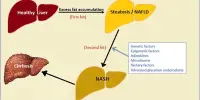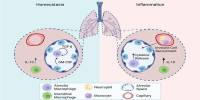Weather and climate have a large impact on human health. We are used to weather having an impact on us. Some diseases become more prevalent or disappear as the temperature of the environment rises or falls or as the seasons change.
A study of nearly 2.3 million Europeans found negative associations between cold weather and heart disease deaths, particularly in poor neighborhoods. The groundbreaking research will be presented at the ESC Congress 2022. Excess deaths from heart disease and stroke have been linked to hot weather in patients with heart conditions.
According to study author Professor Stefan Agewall of the University of Oslo in Norway: “Climate change is causing the average global temperature to rise, but it is also causing extreme cold in some areas. Due to intense heatwaves, more than 70,000 people died in excess across Europe during the summer of 2003. Excess deaths and hospitalizations are also attributed to cold weather. Previous research on the cardiovascular effects of heat and cold primarily relied on aggregated data, such as daily deaths in a city. Individual data was used in the EXHAUSTION project to identify vulnerable subgroups for protective interventions, increasing resilience to future weather events.”
Climate change is causing the average global temperature to rise, but it is also causing extreme cold in some areas. Due to intense heatwaves, more than 70,000 people died in excess across Europe during the summer of 2003. Excess deaths and hospitalizations are also attributed to cold weather.
Professor Stefan Agewall
The study included 2.28 million adults from five cohort studies conducted between 1994 and 2010 in Italy, Germany, the United Kingdom, Norway, and Sweden. The average age ranged from 49.7 to 71.7 years, with women accounting for 36.0% to 54.5% of the population. Participants with and without cardiovascular disease at the start of the study were included. Death and disease registries, as well as follow-up surveys, were used to collect data on mortality and new-onset disease. Daily average air temperatures at participants’ homes were collected from local weather stations or estimated using weather station temperature data modeling.
The relationships between temperature and cardiovascular conditions and death were analysed for all participants and in subgroups with particular characteristics. A time-stratified case-crossover study design was used where for each participant, the researchers compared the temperature on the day of the week an adverse event occurred (e.g. Monday) with the temperature on the same day of the week without an adverse event (e.g. all remaining Mondays) within the same month. Using within-participant comparisons between days in the same month eliminated the potential confounding effects of participant characteristics and time trends.

The study discovered an increased risk of death from cardiovascular disease in general, and ischaemic heart disease in particular, as well as an increased risk of new-onset ischaemic heart disease associated with cold weather. There was a 19% increased risk of death from cardiovascular disease (relative risk [RR] 1.19; 95% confidence interval [CI] 1.04-1.36) and a 22% increased risk of death from ischaemic heart disease (RR 1.22; 95% CI 1.07-1.38). A temperature drop of about 11°C, from 2°C to -9°C, was associated with a 4% increased risk of new-onset ischaemic heart disease (RR 1.04; 95% CI: 1.01-1.08).
Professor Agewall said: “The relationships between cold temperatures and deaths were more pronounced in men and people living in neighbourhoods with a low socioeconomic status. The links between cold and new-onset ischaemic heart disease were stronger among women and people older than 65 years.”
Heat had no negative effects on the study population as a whole. Temperature increases from 15°C to 24°C, on the other hand, were associated with 25% (RR 1.25; 95% CI 1.12-1.39) and 30% (RR 1.30; 95% CI 1.10-1.53) higher risks of death from cardiovascular disease and stroke in people with heart disease at baseline, respectively.
Prof. Agewall stated: “Clinicians can use this data to provide tailored advice to those who are most vulnerable to adverse health outcomes on hot and cold days. In hot weather, patients with heart conditions should stay hydrated and follow their cardiologist’s medication instructions. We can all monitor the news for extreme heat and cold alerts and follow local authorities’ safety recommendations.”
















